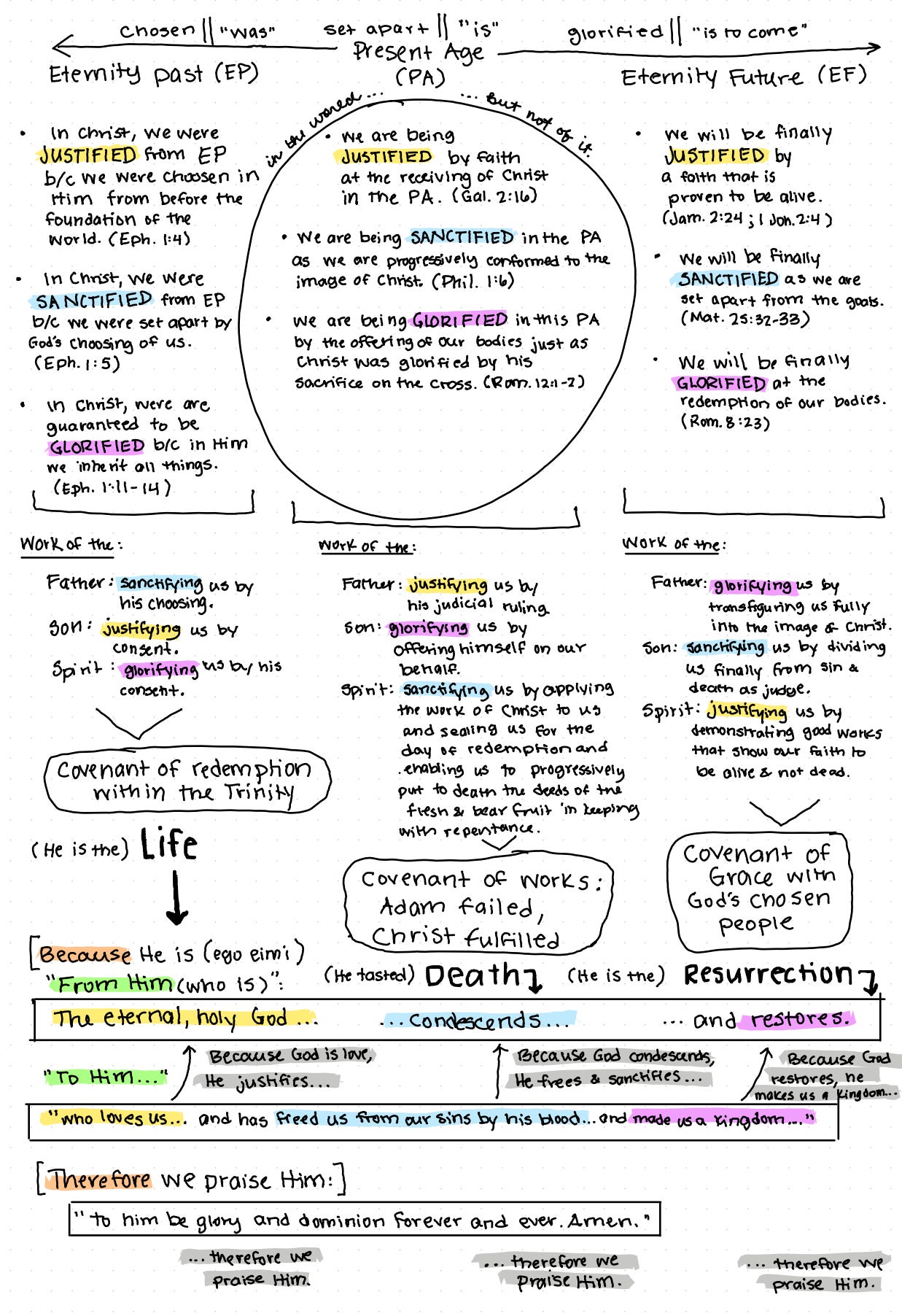(I made a mistake in the last podcast/article. I originally quoted Revelation 1:4-8, but realized I was only going to make it through half of verse five. I shortened the quote, but forgot to change the reference. I corrected the mistake in the article, but in the podcast for Part 4, you will hear me cite Revelation 1:4-8 when the reference should actually be Revelation 1:4-5a.)
“To him who loves us and has freed us from our sins by his blood and made us a kingdom, priests to his God and Father, to him be glory and dominion forever and ever. Amen. Behold, he is coming with the clouds, and every eye will see him, even those who pierced him, and all tribes of the earth will wail on account of him. Even so. Amen.
‘I am the Alpha and the Omega,’ says the Lord God, ‘who is and who was and who is to come, the Almighty.’” - Rev. 1:5b-8
Do you ever stop to think about yourself in time? Do you ever stop to think about God in time? What about God being outside of time? How ‘bout time in relation to salvation? Did you know that salvation is not a one time event?
We tend to think of salvation in time. “I was saved at the age of…” “My brother was saved when…” “She got saved because…” It’s almost always past tense.
But God does not operate in strictly the past tense. And neither does our salvation. It takes a stretch of the imagination, but because God is outside of time, our salvation is ultimately outside of time. There is a sense in which it operates in time, for God himself at one point operated in time as the person of Jesus Christ. But there is more to it than just a past conversion experience.
Let me try to explain what I mean.
Justification, sanctification, glorification
There are three words we use to describe the process of salvation.
We have been saved = justification
We are being saved = sanctification
We will be saved = glorification
But I want to illustrate that perhaps all three can be observed in all three tenses. Don’t take this as a theology set in stone. As I said when we embarked, this is me talking about what I see as I read the book of Revelation. You’re free to think I’m overcomplicating things or just plain wrong. But, in my opinion, we take the Bible way too linearly. (Yes, linearly, but also sometimes too literally!) It doesn’t always neatly categorize the roles of each person in the Godhead or chronologically relate the process of salvation as we like to do in common conversation.
Justification in three tenses
Let’s just start with the idea of justification. What do we typically say? Well, just as we tend to speak like “I was saved when…” we tend to sort of pigeon-hole justification to that same moment of conversion.
Charles Spurgeon grappled with Puritan John Gill’s writings on the idea of our being justified from eternity past. He said:
“With regard to adoption, I believe we were predestined hereunto in eternity, but I do think there are some points with regard to adoption which will not allow me to consider the act of adoption to have been completed in eternity. For instance, the positive translation of my soul from a state of nature into a state of grace is a part of adoption or at least it is an effect at it, and so close an effect that it really seems to be a part of adoption itself: I believe that this was designed, and in fact that it was virtually carried out in God's everlasting covenant; but I think that it was that actually then brought to pass in all its fullness. So with regard to justification, I must hold, that in the moment when Jesus Christ paid my debts, my debts were cancelled - in the hour when he worked out for me a perfect righteousness it was imputed to me, and therefore I may as a believer say I was complete in Christ before I was born, accepted in Jesus, even as Levi was blessed in the loins of Abraham by Melchisedec; but I know likewise that justification is described in the Scriptures as passing upon me at the time I believe. "Being justified by faith," I am told "I have peace with God, through Jesus Christ." I think, therefore that adoption and justification, while they have a very great alliance with eternity, and were virtually done then, yet have both of them such a near relation to us in time, and such a bearing upon our own personal standing and character that they have also a part and parcel of themselves actually carried out and performed in time in the heart of every believer.”1
What Spurgeon is saying is that while we tend to speak of being justified in the moment of our conversion, there is also a sense in which we were justified from eternity past because of God’s decree before the world began. Or, to speak like the Bible speaks, we were “predestined for adoption as sons” (Eph. 1:5), meaning our justification was guaranteed from the foundation of the world. Judicially speaking, our justification was completed at the cross. Still in another sense, as Spurgeon explained, our justification is applied at our particular moment of conversion. And even still there is a sense in which we will be justified in the future.
Final justification—but not the Catholic way
Just as John Gill was controversial for his view on justification from eternity past, John Piper is known for his controversial view on “final” or “future” justification:
James 2:17 says, “Faith by itself, if it does not have works, is dead.” Dead faith doesn’t justify anybody; therefore, faith without works is not the kind of faith that justifies anybody. These works are — here’s where it starts to get difficult for people, but let me see if I can help — these works are necessary.
Hebrews says, “Strive for peace” — strive is the key word — “and [strive] for the holiness without which no one will see the Lord” (Hebrews 12:14). We won’t see the Lord Jesus — that is, we won’t be finally saved — without this “striving for holiness.”
What is that? Why is that? The apostle John says, “Whoever says ‘I know him’ but does not keep his commandments is a liar, and the truth is not in him” (1 John 2:4). Or he says later, “We know that we have passed out of death into life, because we love the brothers.” That’s how we know; it’s confirmed. “Whoever does not love abides in death” (1 John 3:14) — in other words, you haven’t been born again, you haven’t been united to Christ, you don’t have saving faith because it’s not confirmed by love.
Obedience and love are the necessary confirmations that we are born again, truly united to Christ by faith alone. Here’s the way Paul says it: “God chose you as the firstfruits to be saved, through sanctification by the Spirit and belief in the truth” (2 Thessalonians 2:13).
We are not justified through sanctification. Let me say it again: we are not justified through sanctification. But we are finally saved through sanctification — that is, through a real change in our hearts and minds and lives without which we will not see the Lord.2
I encourage you to read the whole article from John Piper to gain more clarity on the idea of our being “finally justified” by our “works.” Because Catholics have a doctrine of final justification,3 this idea tends to be rejected outright by Protestants. But I want us to give more consideration to the timelessness of salvation. Just because Catholics have a similar doctrine does not make it the same. Catholic final justification depends on a person producing their own righteousness through “infusions” of grace and justification can be lost. But biblical justification cannot be lost because it does not depend on “infusions” of grace, but on the imputation of Christ’s righteousness to us, which never changes.
Flexible fences
My point is, as Protestants, when we speak of salvation in its three tenses, we say:
Past = Justification
Present = Sanctification
Future = Glorification
And those fences make it difficult to converse on the topic with people who speak differently about it. Not just Catholics, whom I think we could actually create more common ground with while drawing clear boundaries in the places we fundamentally disagree. But we also lose patience with each other as Protestants.
Already sanctified or currently being sanctified?
For instance—and this brings us to the point of sanctification—I once got into a very frustrating conversation with an online acquaintance about the nature of sanctification. She argued that progressive sanctification was nowhere to be found in the Bible. That we were sanctified once for all. And it was very bewildering for me to try to make it clear that justification and sanctification are separate occurrences and that she was conflating the two. It would have been helpful to have an understanding of these concepts in all their tenses. She was talking about a past event. I was talking about a present one. The reality is that it’s both.
It’s very important to define what we mean. And to speak like the Bible speaks as much as we can. Moving forward, I think we need to be firm in doctrine, but flexible in terms so that we can hear people whose labels may be slightly different from our own. There must be fences, but through flexible fences, we may come to more unity in the truth rather than division over particular doctrinal emphases.
Glorification & the Golden Chain
I think all three words (justification, sanctification, glorification) are flexible, because God is timeless. Let’s consider glorification. Even Paul did not speak of glorification as though it was strictly a future reality. That we would only be glorified in Christ when we receive new bodies. Referring back to John Piper’s article, he says:
“Glorification in Paul’s thinking is a process that begins at conversion. It doesn’t begin at the last judgment. It begins at conversion and includes sanctification. It’s consummated at final salvation.”
We deduce this in part because of how Paul speaks when he writes what we call “the golden chain of redemption” in Romans 8. In the chain, glorification isn’t referred to in the present or future, but in the past:
“For those whom he foreknew he also predestined to be conformed to the image of his Son, in order that he might be the firstborn among many brothers. And those whom he predestined he also called, and those whom he called he also justified, and those whom he justified he also glorified.” - Romans 8:29-30
It is called the golden chain because it contains five “links” which trace the plan of redemption from eternity past into eternity future. Consider that they are all written in the past tense: foreknew, predestined, called, justified, glorified. This ties back into our dynamic of “already and not yet.”
Mapping Many Thoughts
So what does this have to do with Revelation 1:5-8?
You know, I really don’t know. But I’ll tell you how I started and maybe you will follow my logic along the way. Maybe not. I read this passage and I started to think about… well, let’s read it again.
“To him who loves us and has freed us from our sins by his blood and made us a kingdom, priests to his God and Father, to him be glory and dominion forever and ever. Amen. Behold, he is coming with the clouds, and every eye will see him, even those who pierced him, and all tribes of the earth will wail on account of him. Even so. Amen.
‘I am the Alpha and the Omega,’ says the Lord God, ‘who is and who was and who is to come, the Almighty.’” - Rev. 1:5b-8
There is another set of three here just like there was in Revelation 1:4. That was the first thing that caught my attention:
“To him who loves us
and has freed us from our sins by his blood
and made us a kingdom, priests to his God and Father”
And as I was thinking about those three descriptions, I started to think about them in time as well as out of time. I thought about the difference between these descriptions and the ones from verse 4. I thought about which person of the trinity fulfills each of these. I thought about which one points to justification, which to sanctification, and which to glorification. I thought well why does it have to just be one of those for each description? I thought about what has happened already and not yet. And it all just became too big. The more you think about it, the more our redemption appears less like a timeline and more like a snowflake expanding outward in concentric circles until it becomes too big for our field of view. And that’s exactly how Paul spoke about it when he said we see “through a glass darkly” (1 Cor. 13:12). So to expand our view as much as the Bible allows it, and as much as I’m able to squeeze out of Revelation 1:4-8 onto one sheet of paper, I drew a map.
A Map of Our Redemption from Eternity Past through the Present Age & into Eternity Future
Explanation of the Map
Starting at the top, we have time stretched out infinitely in both directions. We were chosen in Christ from eternity past, we are set apart in Christ in this present age, and we are glorified in Christ into eternity future. The circle represents our world in time. Not just this present moment, but “the present” referring to our existence in time. And on either side of it, we step outside of time.
In yellow, I have highlighted our justification, as it was decreed from eternity past, as it is enacted in the present age, and as it is guaranteed into eternity future. I also highlighted how each person of the trinity works in our justification.
I have done the same for sanctification in blue and glorification in pink.
Below the work of each person of the trinity, I mapped the covenants. The covenant of redemption was made within the trinity from eternity past, the covenant of works was fulfilled by Christ in this present age, and the covenant of grace is guaranteed into eternity future. These covenants spell out the gospel—that Christ lived the life that we could not (because he IS the life!), he tasted death on our behalf, and resurrected forevermore.
Because… therefore
Now pair all of that with our passage from part 4. We have a God who says I Am. “I Am the one who is and who was and who is to come.” And, first, he tells us what that means: that he is eternal and holy, he condescends into time, and he restores what is broken. Now, this passage told us who God is, what is his nature. We receive this revelation of grace and peace “from him” who is these things. Immediately after, in verses 5 and 6, we are told what results from the nature of his being.
Because God is eternal, holy, and condescends as faithful witness, firstborn from the dead, and King over all…
Therefore he loves us, has freed us, and has made us a kingdom of priests.
And when we read this, we map it out and think of what it means, and pause long enough to try to comprehend… well, as Paul prays on our behalf: to “have strength to comprehend with all the saints what is the breadth and length and height and depth, and to know the love of Christ that surpasses knowledge,” (Eph. 3:18-19) what is our response?
Because he is love, the everlasting love that justifies the ungodly—therefore we praise him.
Because he is the love that condescends to pay the price of death to free from sin and set apart an undeserving people—therefore we praise him.
Because he is the love that restores the broken and makes them a kingdom of priests—therefore, we praise him.
Because he is and from him we receive these things—therefore we praise him. And that is how this book talks to us. Look at this God, look at this life, look at this sacrifice, look at what love. What else could we possibly have to give? And knowing all this, how else could we possibly respond, except to say:
“to him be glory and dominion forever and ever. Amen.”
https://www.pristinegrace.org/article.php?id=39
https://www.desiringgod.org/interviews/will-we-be-finally-saved-by-faith-alone
https://www.ewtn.com/catholicism/library/justification-in-catholic-teaching-1063














